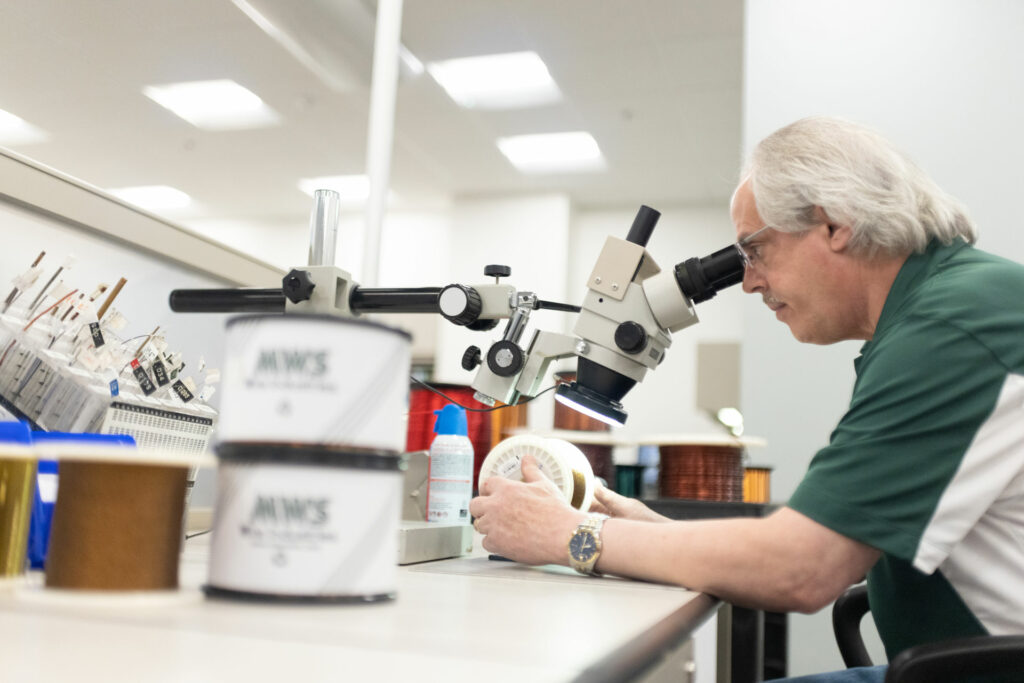MWS Wire /
Resistance wire is primarily used as an electrical resistor. Resistance wires restrict the flow of current which converts electrical energy into heat. Beyond simple resistors, resistance wire is an essential component in many applications like RTD sensors, thermocouples, rheostats, voltage control relays, heating elements and potentiometers. The key to selecting the perfect resistance wire is found in the unique properties of the wire based on the alloy used.
Factors to consider when choosing a Resistance wire.
Resistivity:
Resistivity is a fundamental parameter of resistance wire, which is determined based on electric flow that needs to be controlled or the amount of heat that the wire needs to generate.
Temperature Coefficient of Resistance (TCR):
When stability is critical, the alloy's TCR is an essential factor in material selection.
Corrosion and Oxidation Resistance:
An alloy's ability to withstand corrosion is critical, especially in harsh environments. Alloys with good oxidation resistance avoid oxide layers contaminating their surfaces and protect wire from thermal fatigue.
Geometry:
The shape of the wire is proportional to its resistance. MWS can produce round wire to resistance specifications and provide special shaped requirements.
Material (Alloys):
Refer to the table below for resistivity values by alloy.
Wire Resistance Calculator
Imperial Results
Wire Size
inches
Resistivity
Ω-Cir.mil/ft
Resistance (nom)
Ω/ft
±5% range (min)
Ω/ft
±5% range (max)
Ω/ft
±3% range (min)
Ω/ft
±3% range (max)
Ω/ft
Metric Results
Wire Size
mm
Resistivity
Ω-mm²/meter
Resistance (nom)
Ω/meter
±5% range (min)
Ω/meter
±5% range (max)
Ω/meter
±3% range (min)
Ω/meter
±3% range (max)
Ω/meter
Resistance Wire Data
| Material | Resistivity | |
| (Ω-Cir.mil/ft) | (Ω-mm²/meter) | |
| Aluminum | 17 | 0.0283 |
| Brass (30Zn, 70Cu) | 37 | 0.0615 |
| Constantan | 294 | 0.4888 |
| Copper | 10.371 | 0.0172 |
| Iron | 57.81 | 0.0961 |
| Manganin | 290 | 0.4821 |
| Molybdenum | 32.12 | 0.0534 |
| MWS 675 (Nichrome) | 675 | 1.1221 |
| MWS 650 (Nichrome V) | 650 | 1.0806 |
| Nickel 205 | 57 | 0.0948 |
| Nickel 270 | 45 | 0.0748 |
| Platinum | 63.91 | 0.1062 |
| Stainless Steel 304 | 433.1 | 0.7200 |
| Stainless Steel 316 | 444.6 | 0.7391 |

Resistance Wire Technical Data
Need more info about resistance wire? See the Data Sheet in our Tech Book.

Product Spotlight
Resistance Wire
Chromium based Alloys (Heating wire)
MWS-650 | MWS-675 | MWS-800
MWS-875
Advantages:
- High resistivity
- Good oxidation resistance
- High mechanical strength
- Can operate at temperatures up to 2192°F
Applications:
- Commonly used as heating elements in both domestic and industrial appliances
- Widely used as tool wire in EDM machining for precise metal cutting
- Hot wire cutting and sealing capabilities for foam, plastics and rubber
Available in: Annealed and Temper conditions per ASTM B344
Nickel-Iron based Alloys
MWS-42 | MWS-52 | MWS-120
Advantages:
- Self-limiting heating wire, the resistance doubles at 482°F and reduces power at overheating
- High coefficient of resistance (TCR)
- Strong magnetic attraction
Applications:
- Low temperature heating devices
- Voltage regulator, sensors, temperature sensitive resistors, potentiometers, timing devices and temperature compensating devices
- Measure flow of fluids at a certain flow rate range
Available in: Annealed and Temper conditions per ASTM F30
Nickel-Copper based Alloys
MWS-30 | MWS-60 | MWS-90
MWS-180 | MWS-294
Advantages:
- Low resistance applications up to 750°F
- Higher coefficient of resistance (TCR)
- Good stability
Applications:
- Thermocouples, RTD sensors
- Wire wound precision resistors, rheostats, voltage control relays
Available in: Annealed and Temper conditions per ASTM B127
Pure-Nickel based Alloys
Nickel-200 | Nickel-205 | Nickel-270
Advantages:
- Suitable for high temperatures up to 2600°F
- Highly resistant to oxidation and corrosion
- Strong magnetic attraction
Applications:
- Medical devices
- Magnetic transducers, lead wires
- Fire protection systems in aircrafts
Available in: Annealed and Temper conditions per ASTM F1, F2, F3
Others
MWS-294R | Manganin | Inconel*
Advantages:
- Low temperature coefficient of resistance (TCR)
- Suitable for low temperature applications
Applications:
- Electrical conductor in Cryogenic, sensors, medical devices
- Hermetic glass-to-metal sealing
Available in: Annealed and Temper conditions per ASTM B127 (MWS-294R) and ASTM B267 (Manganin)
*For more info on Inconel wire, refer to our Mechanical Alloys page.
Special Processes
Wire is available in sizes 14 – 44 AWG with the following options:
- Soft/Hard Temper
- Bare
- Insulated
- Shaped
- Plated
- Bondable
- Can be made to resistance
- Laser ablated reel-to-reel
- Discrete lengths cut to size
Trade Name Cross Reference
| MWS Wire | Carpenter Tech. | Driver-Harris | Harrison | Hoskins | Jelliff | Kanthal | Molecu |
|---|---|---|---|---|---|---|---|
| MWS - 875 | Alchrome 875 | - | HAI-FeCr Al25 | Alloy 875 | - | Kanthal A-1 | - |
| MWS - 800 | Evanohm | Karma | HAI-431 | Chromel R | Alloy 800 | Nikrothal L | Moleculoy |
| MWS - 675 | Tophet C | Nichrome | HAI-NiCr 60 | Chromel C | Alloy C | Nikrothal 6 | Electroloy |
| MWS - 650 | Tophet A | Nichrome V | HAI-NiCr 80 | Chromel A | Alloy A | Nikrothal 8 | Protoly |
| MWS - 294 | Cupron | Advance | HAI-CuNi 102 | Copel | Alloy 45 | Cuprothal 294 | Neutroloy |
| MWS - 294R | Kovar | - | HAI-373 | - | - | - | - |
| MWS - 180 | 180 Alloy | Midohm | HAI-180 | Alloy 380 | Alloy 180 | Cuprothal 180 | - |
| MWS - 120 | Balco | Hytemo | HAI-380 | - | Alloy 120 | - | Pelcoloy |
| MWS - 90 | 90 Alloy | #95 Alloy | HAI-90 | Alloy 290 | Alloy 90 | Cuprothal 90 | - |
| MWS - 60 | 60 Alloy | Lohm | HAI-60 | Alloy 260 | Alloy 60 | Cuprothal 60 | - |
| MWS - 30 | 30 Alloy | #30 Alloy | HAI-30 | Alloy 230 | Alloy 30 | Cuprothal 30 | - |
*All trademarks are the property of their respective owners

Looking for something specific?
We probably have it in stock. If we don't, we can make it faster than you'd think!
Why Choose MWS?
Quick and Right Answers.
We invest heavily in our customer service and engineering team so that we can give you the right answers and the most effective customized solutions. Our success, as well as our very purpose, is directly linked to the long-term satisfaction of our customers using our wire products.
Unrivaled Availability, Low Minimum Order Quantity, and Quick Delivery.
MWS has one of the largest inventories of stainless-steel wire and other wire products. We provide wire from 1/4lb to 50lb spools. Ninety percent of our stock orders go out within a week. Short production runs and quick turnarounds are our specialty.
Pre-cut Wire Lengths and Other Custom Orders.
We can provide straight wire cuts from one inch to 6-foot lengths holding the tolerances you require for your specific application. Need shaped wire? We have a variety of special shapes including square wire, flat wire, and ribbon wire. Special coatings and finishes are available as well.
Headache Free Compliance Documentation.
Let us help you satisfy your customer's needs for clear and comprehensive compliance documentation including RoHS, REACH, DFARS, MADE IN USA, USMCA, etc. Chemical and physical testing reports are also available upon request.
Let Us Manage Your Inventory for You.
With 40,000 sq. ft. of warehouse space and thousands of products in stock, inventory management is our specialty. It doesn't have to be yours. Whether it's same day shipment from inventory or producing a wire to meet just-in-time schedules, we can get what you need when you need it. Ask about scheduled shipments synchronized to work with your inventory control, JIT, or Kanban system.





